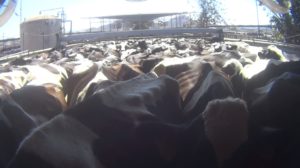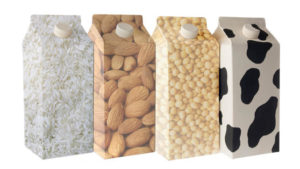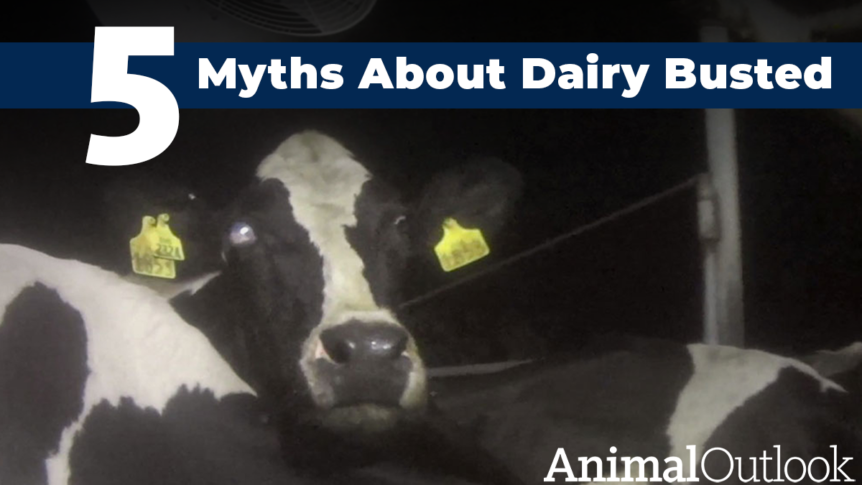From just about birth, most of us are told that we have to drink our milk to grow big and strong. In children’s books we see happy cows being milked in big red barns by caring, overall-clad farmers. But what if we’ve been lied to this whole time?
If you’re ready to open your eyes and learn the uncomfortable truth about dairy, keep reading. Here are five myths we’ve been spoon-fed with our cereal and why they’re simply not true.
1. Calcium builds strong bones–especially in kids.
Nope. While cow’s milk does contain calcium, studies have shown that regular milk drinking can lead to brittle bones and a higher risk of fracture. Plus, the body only absorbs 30 percent of milk’s calcium, so you’re better off eating leafy greens and veggies like bok choy with higher calcium bioavailability.
The dairy industry has targeted families with kids for years, even funneling surplus milk into schools to maximize profits. But the way the dairy lobby portrays milk as an ethical and healthy beverage couldn’t be further from the truth, and the health benefits of animal products pale in comparison to whole plant foods and plant-based milk.
 2. Dairy cows live happy lives
2. Dairy cows live happy lives
This myth could not be farther from the truth. Though the dairy industry advertises “happy cows” in lush green pastures, most dairy cows in the United States are crammed together with limited space, forced to live with untreated medical issues (many a result of squalid conditions and painful robo-milking), and separated from their young at birth.
Animal Outlook investigations have uncovered these horrifying cruelties at many industrial dairy farms, including so-called “family farms” like Martin Farms. At Dick Van Dam, our investigator witnessed cows with injuries that would make your stomach turn. And when these cows can no longer walk, they are often pulled away by a “hip clamp,” and dragged by a tractor.
3. Cows need to be milked, so we’re doing them a favor
Cows, like all mammals, only produce milk when they are pregnant or have recently given birth. That means that cows aren’t just walking around all the time with painful udders that farmers do them the favor of relieving–they are impregnated for the explicit purpose of their milk being taken to sell. This means that their male calves are considered useless byproducts and are typically taken from their mothers shortly after birth. Just like humans and other mammals, mother cows have a deep bond with their offspring, and many have been known to agonizingly cry out for their lost babies.
So no, cows don’t need to be milked–humans force them into a cycle of cruelty that deprives calves of their most instinctual, natural source of nourishment and treats mothers as little more than machines.
4. Buying dairy doesn’t kill animals
 As you now know, male calves are considered byproducts of the dairy industry and cast aside so that milk can be harvested from their mothers and sold. At these facilities, female calves will likely become dairy cows themselves. But male calves will be sold for meat, confined and sold for veal, or left to die. To the industry, their lives are worth nothing and their suffering is just part of the business.
As you now know, male calves are considered byproducts of the dairy industry and cast aside so that milk can be harvested from their mothers and sold. At these facilities, female calves will likely become dairy cows themselves. But male calves will be sold for meat, confined and sold for veal, or left to die. To the industry, their lives are worth nothing and their suffering is just part of the business.
If you’re vegetarian, you may not be eating fast-food burgers, but that doesn’t mean you’re not funding them. By purchasing milk and cheese products, you’re supporting cheap beef. In many cases, when dairy cows are considered “spent,” and produce less milk as a result of repeated pregnancies and births, they are sold for cheap cuts of beef, many ending up as fast-food hamburgers.
5. Lactose intolerance isn’t a big deal
People sometimes say dairy products like ice cream or cheese pizza upset their stomach, but often power through anyway despite the discomfort to come. But lactose intolerance is more common than you’d think–about 65 percent of the global population can’t tolerate lactose. Why? Maybe because they’re not baby cows.
 Get educated, eat healthy and save animals. Now you know the truth behind the cruel dairy industry and can make more informed decisions at the grocery store. To help get you started, here’s a list of some of the best plant-based milks on the market. Your body, the animals and the planet will thank you.
Get educated, eat healthy and save animals. Now you know the truth behind the cruel dairy industry and can make more informed decisions at the grocery store. To help get you started, here’s a list of some of the best plant-based milks on the market. Your body, the animals and the planet will thank you.


Comments 1
Thank you for the information. Maybe one day people will learn to eat without harming animals and birds.